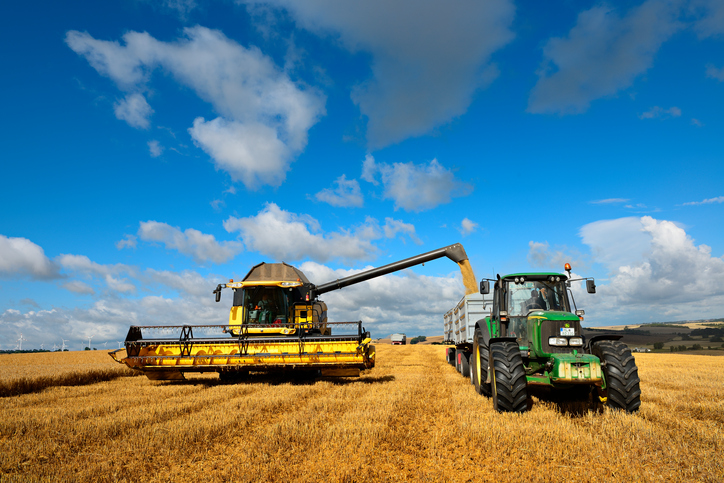Wheat is a kind of grass.
Australia grows lots of it on big farms.
We sell it to other countries.
When it is ready, the wheat is harvested.
The seeds, or grains, are ground to make flour.
Flour is used to makes bread and pasta and lots of other foods.
Australian wheat
Australia produces large amounts of wheat and sells some of it to other countries. © Getty Images
Wheat is the largest grain crop in Australia.
Most wheat varieties grown in Australia are sown in autumn and harvested in summer.
Australia is one of the top ten wheat producer in the world.
About 25 million tones is produced each year. But this can vary depending on the weather in a particular wheat growing area. The annual value of the crop is about $ 2 billion. Most of Australia's wheat is produced in New South Wales and in Western Australia.
Australian wheat is exported (sole and sent) to Asian and Middle East regions and include Indonesia, Japan, South Korea, Malaysia, Vietnam and Sudan.
In Australia the wheat is used to make flour, as stock feed, and as seed for the next year's crop.
How wheat is grown
Wheat is grown from seeds. After ploughing the paddocks to break up the soil, the farmer uses a tractor to pull a machine called a drill that plants the seeds into long ditches. Fertiliser, (food for plants) can be added by the machine to make the wheat plants grow strong.
As the plants grow, a head of seeds forms at the top of the plant. It hardens and becomes yellow as it ripens.
When it is ready, dry and fully ripened, the farmer uses a combine harvesting machine to collect the ripe grain.
The harvester pours the grain into trucks.
A combine harvester unloads grain into a tractor trailer © iStock/Getty Images
The combine harvester is driven through the paddocks where it cuts the wheat, cleans and separates the seeds or kernels from the rest of the plant.
The ripened wheat is stored in silos until is is sold.
The dry plant, or hay, that is left behind is used to feed farm animals.
Silos are storage places for wheat until it is sold. © Getty Images
A new crop of wheat is planted each year.
History of wheat
It is thought that wheat was first grown about 12 000 years ago in the Middle East, in countries we now call Syria and Iraq.
About 6 700 BC prehistoric people ground grains of wheat to make flour.
The ancient Egyptians added yeast to flour to make their bread rise. They were the first to have bread ovens.
Windmills were used to grind flour in Syria, England and France about nearly 900 years ago
An early wheat harvester © iStock/Getty Images
Before there were machines, wheat was planted and harvested by hand.
Mechanical farm machinery was invented from about the 1700s.
Harvesting wheat by hand. iStock/Getty Images
Top Wheat Producing
Countries
China
India
USA
Former USSR
France
Canada
Australia
Germany
Pakistan
Turkey
Wheat for good health
Grains of wheat are crushed to make flour © iStock/ Getty images
© iStock
Wheat contains essential vitamins and minerals such as:
B-vitamins for the digestive system and to help the body use energy properly.
Calcium for healthy bones and teeth.
Wheat grains are crushed to make flour which is then used to make bread and pasta.
Starch from wheat is used in the making of paper and plastic bags and in the production of glue and adhesives.
It is always a good idea to use more than one source of information. So here are some for you to investigate
Read about early farm machinery on a timeline
Read about farm machinery
http://www.agrotechnomarket.com/2012/02/list-of-farm-machinery-in-agriculture.html









